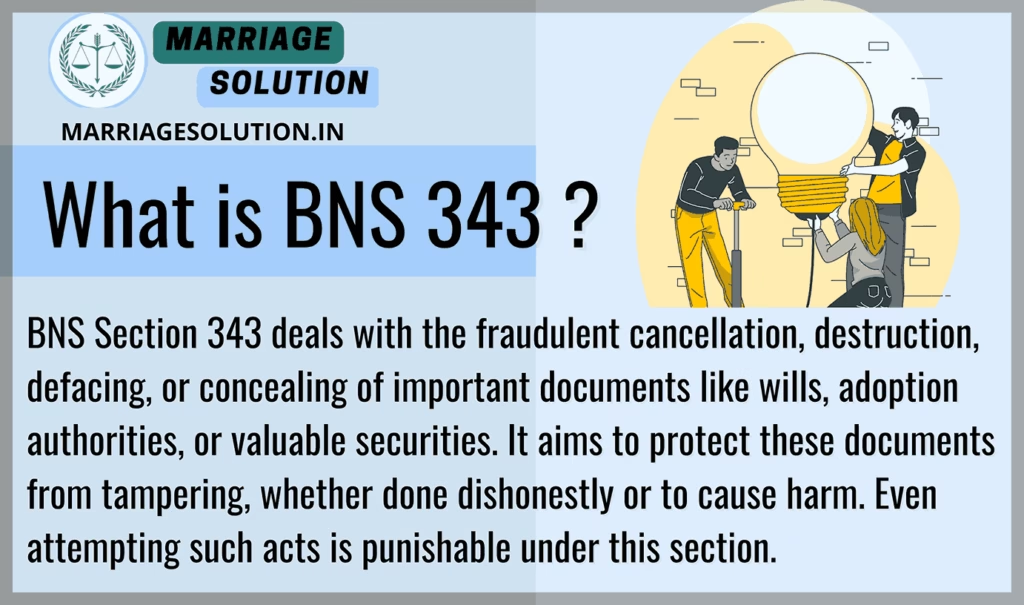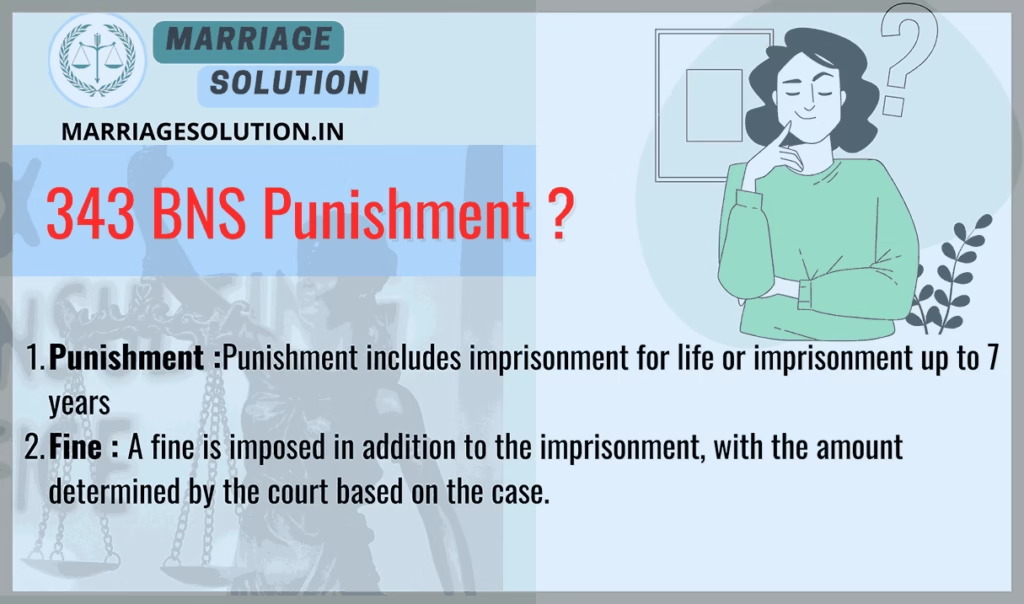Introduction of 343 BNS
343 BNS deals with the fraudulent cancellation, destruction, defacement, or concealment of critical documents, such as wills, authority to adopt, and valuable securities. This provision ensures that no one can tamper with or suppress such documents for personal gain or to cause harm. Even an attempt to interfere with these records is punishable, reflecting the seriousness of protecting inheritance rights, financial instruments, and adoption authorities. Replacing IPC Section 474, this law introduces stricter safeguards to maintain public trust in legal and financial systems.
The Bharatiya Nyaya Sanhita (BNS) Section 343 replaces the old Indian Penal Code (IPC) Section 474.
What is BNS Section 343 ?
BNS Section 343 deals with the fraudulent cancellation, destruction, defacing, or concealing of important documents like wills, adoption authorities, or valuable securities. It aims to protect these documents from tampering, whether done dishonestly or to cause harm. Even attempting such acts is punishable under this section.

Under Section 343 of the bns act 2023
Whoever fraudulently or dishonestly cancels, destroys, defaces, or conceals any will, authority to adopt, or valuable security, or attempts to do so, intending to cause damage or injury, shall be punished with imprisonment for life, or imprisonment of either description up to seven years, and shall also be liable to fine.”
(This provision replaces IPC Section 474.)
1. Meaning of Section 343
BNS Section 343 punishes the fraudulent cancellation, destruction, defacement, or concealment of:
- Wills
- Authority to adopt
- Valuable securities
It covers not just successful acts but also attempts to commit such acts.
Example → Burning a will before probate to cheat the legal heir.
2. Who is Covered?
- Individuals → Destroying or hiding a family will.
- Legal guardians/relatives → Concealing adoption papers.
- Third parties → Tampering with securities, bonds, or shares to cause loss.
3. Types of Fraudulent Acts under BNS 343
- Cancellation → Revoking or striking out contents of a will or security.
- Destruction → Burning or tearing documents to invalidate them.
- Defacement → Altering words, figures, or signatures on a document.
- Concealment → Hiding or withholding a will, adoption authority, or valuable paper.
- Attempt → Even trying to do the above is punishable.
4. Intent as a Key Element
Punishment applies only when the act is done:
- Dishonestly → To gain an undue advantage.
- Fraudulently → To cheat or cause harm.
- With intent to cause injury/damage → To deprive someone of their legal or financial rights.
Example → A nephew hides his uncle’s will so that he inherits property.
5. Punishment under BNS Section 343
- Imprisonment for life, OR
- Imprisonment up to 7 years, AND
- Fine (decided by court depending on severity).
This reflects the seriousness of tampering with highly important documents.
6. Nature of the Offence
- Bailability → Non-bailable (bail not a right, depends on court discretion).
- Cognizability → Non-cognizable (police need Magistrate’s order to investigate/arrest).
- Compoundability → Non-compoundable (cannot be settled privately).
- Trial by → Magistrate of the First Class.
7. Examples of BNS Section 343 in Action
- Example 1 – Destroying a Will
A person tears and burns their brother’s will so property rights do not pass to the intended heir. → Punishable under Section 343. - Example 2 – Concealing Adoption Authority
An individual hides legal papers granting authority to adopt a child. → Fraudulent concealment, punishable. - Example 3 – Defacing a Valuable Security
Altering figures on a bond or security to reduce another’s entitlement. → Covered under this section.
8. Importance of BNS Section 343
- Protects family rights and inheritance.
- Safeguards financial instruments like bonds, shares, or securities.
- Ensures wills and adoption rights are not tampered with.
- Builds public trust in legal documentation.
Section 343 BNS Overview
BNS Section 343 addresses fraudulent or dishonest actions involving the cancellation, destruction, defacement, or concealment of important legal documents such as wills, authorities to adopt, or valuable securities. It also includes attempts to commit such acts with the intent to cause harm or injury to the public or individuals. These actions are treated as serious offenses to protect the authenticity and security of critical legal documents.
BNS Section 343: Fraudulent Cancellation, Destruction, etc., of Will, Authority to Adopt, or Valuable Security
1. Fraudulent Acts Covered
BNS Section 343 penalizes actions like fraudulently canceling, destroying, defacing, or concealing documents such as wills, authorities to adopt, or valuable securities. These acts are considered severe as they interfere with the legal and financial entitlements of individuals. Even attempting to engage in such fraudulent acts falls under this section, ensuring comprehensive protection against misuse.
2. Protecting Critical Documents
This section safeguards critical legal documents that hold significant personal and financial importance. Wills, for instance, outline the wishes of a deceased person, while valuable securities represent monetary value. By criminalizing their tampering, the section ensures the authenticity and reliability of these documents are maintained.
3. Intent Plays a Key Role
The section emphasizes the intent behind the act. If the offender’s purpose is to cause harm, loss, or injury, either to the public or a private individual, they are held accountable. It highlights that both the motive and the action matter in determining the severity of the crime.
4. Includes Attempts to Commit the Crime
Even if the fraudulent act is not completed, an attempt to cancel, destroy, deface, or conceal the document is punishable. This provision ensures that offenders cannot evade the law by claiming that their actions did not result in actual damage.
5. Severe Punishment for Offenders
The section imposes stringent penalties to deter such crimes. An offender can face imprisonment for life or imprisonment of up to seven years, along with a fine. These punishments reflect the seriousness of tampering with or destroying documents of legal or financial significance.
6. Non-Bailable Offense
Crimes under this section are non-bailable, meaning an accused person cannot claim bail as a matter of right. This classification underscores the gravity of the offense and aims to ensure the accused is appropriately scrutinized before being released.
7. Non-Cognizable Nature of the Offense
Being a non-cognizable offense, the police cannot arrest the accused without prior approval from a magistrate. This ensures that actions under this section are carefully reviewed to prevent misuse of authority or false accusations.
8. Trials Held by Magistrate of First Class
Offenses under this section are tried by a Magistrate of the first class. This ensures that cases are handled by experienced judicial officers, reflecting the importance of ensuring justice in such sensitive matters.
9. Safeguards Against Mischief
The section also covers acts of mischief with these documents. For example, defacing a will or tampering with an authority to adopt with malicious intent is punishable. This provision further broadens the scope of protection offered under this law.
10. Ensuring Public and Personal Trust
By addressing fraudulent actions involving crucial documents, this section upholds public and personal trust in legal and financial systems. It assures individuals that their important documents will be protected against tampering, fostering confidence in the justice system.
Examples of BNS Section 343
Example 1: Destroying a Will
A person destroys their sibling’s will, intending to inherit the property that was otherwise bequeathed to someone else. This fraudulent act is punishable under BNS Section 343 with severe penalties.
Example 2: Concealing an Authority to Adopt
An individual hides a document granting someone the authority to adopt a child, intending to disrupt the legal adoption process. This concealment falls under the ambit of this section and is punishable.
BNS 343 Punishment
Punishment :Punishment includes imprisonment for life or imprisonment up to 7 years
Fine : A fine is imposed in addition to the imprisonment, with the amount determined by the court based on the case.

BNS 343 bailable or not ?
- The offense is non-bailable, meaning bail is not granted as a right and requires judicial discretion.
- This classification ensures that the accused undergoes proper scrutiny before potential release.
Comparison: BNS Section 343 vs IPC Section 474
| Section | Offense | Punishment | Bailable / Non-Bailable | Cognizable / Non-Cognizable | Trial By |
|---|---|---|---|---|---|
| BNS Section 343 | Fraudulent cancellation, destruction, defacement, or concealment of a will, authority to adopt, or valuable security; includes attempts. | Life imprisonment, or imprisonment up to 7 years + fine. | Non-Bailable | Non-Cognizable | Magistrate of the First Class |
| IPC Section 474 (Old) | Fraudulent cancellation, destruction, or concealment of a will, authority to adopt, or valuable security. | Life imprisonment, or imprisonment up to 7 years + fine. | Non-Bailable | Non-Cognizable | Magistrate of the First Class |
BNS Section 343 FAQs
What is covered under BNS Section 343?
BNS Section 343 covers acts like fraudulently canceling, destroying, defacing, or concealing legal documents such as wills, adoption authorities, and valuable securities.
What is the punishment under BNS Section 343?
Punishment includes life imprisonment or imprisonment for up to 7 years, along with a fine.
Is BNS Section 343 a bailable offense?
No, BNS Section 343 is a non-bailable offense, requiring judicial approval for bail.
Does BNS Section 343 include attempts to commit the offense?
Yes, attempts to cancel, destroy, or deface such documents are also punishable under this section.
What types of documents are protected under BNS Section 343?
Documents like wills, adoption authorities, and valuable securities are protected against fraudulent tampering or destruction.
Who handles cases under BNS Section 343?
Cases under this section are triable by a Magistrate of the first class.
Conclusion
BNS Section 343 plays a crucial role in preserving the sanctity of vital legal and financial documents. By punishing fraudulent acts like destroying, defacing, or concealing wills and securities, it ensures that individuals cannot unlawfully alter inheritance rights or financial entitlements. Its strict classification as a non-bailable and non-cognizable offence highlights the seriousness of such misconduct. Ultimately, this section strengthens legal protection, deters fraud, and safeguards both public confidence and personal rights tied to essential documents.
Need Legal Support?
If you are dealing with court cases, marriage problems, or any other legal issue, our team at Marriage Solution – Lawyer Help is here for you. Simply fill out our quick online enquiry form, and we’ll connect you with the right legal expert to support your needs.
Finished with BNS 343 ? Continue exploring the next provisions of the Bharatiya Nyaya Sanhita (BNS), 2023. Each section includes explanations, examples, and plain-language breakdowns for easy understanding.
- 344 BNS : Falsification of accounts .
- https://marriagesolution.in/bns_section/344-bns/
- 345 BNS : Property mark .
- https://marriagesolution.in/bns_section/345-bns/
- 346 BNS : Tampering with property mark with intent to cause injury .
- https://marriagesolution.in/bns_section/346-bns/
- 347 BNS : Counterfeiting a property mark.
- https://marriagesolution.in/bns_section/347-bns/
- 348 BNS : Making or possession of any instrument for counterfeiting a property mark.
- https://marriagesolution.in/bns_section/348-bns/
Full IPC Section List: https://marriagesolution.in/ipc-section-list
All Indian Law & Blogs: https://marriagesolution.in/indian-law/
Full BNSS Section List: https://marriagesolution.in/bnss_section-list
